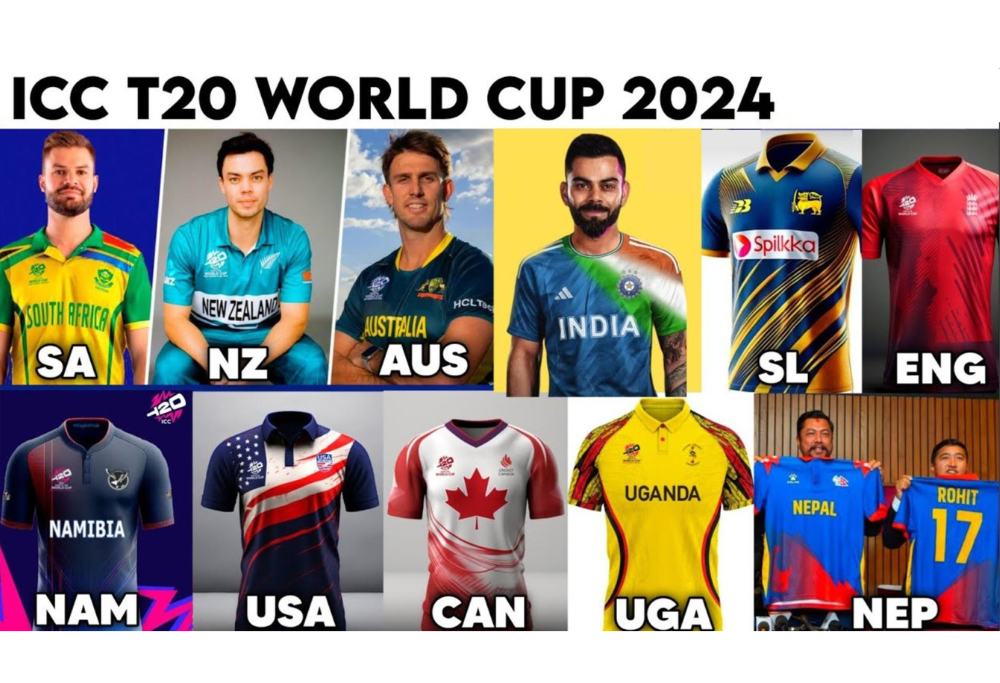The 2024 ICC Men’s T20 World Cup isn’t just about thrilling matches and sporting prowess; it’s also proving to be a catalyst for a significant shift in the fashion world. The tournament is setting new standards for sustainable sportswear,highlighting the growing intersection between athletic performance and environmental responsibility.
Eco-Friendly Fabrics Take Center Stage
The jerseys worn by the teams in the 2024 T20 World Cup are not your average sportswear. Many teams have opted for jerseys made from recycled polyester, a material derived from plastic bottles and other waste. This innovative approach reduces the demand for virgin materials and helps divert plastic waste from landfills and oceans. Some jerseys even incorporate other sustainable materials like organic cotton and bamboo fibers, further minimizing the environmental impact of production.
Designs with a Conscience
The design of the jerseys is also noteworthy. Many teams have incorporated patterns and colors inspired by their natural surroundings, promoting a sense of connection to the environment. For example, the West Indies jersey features a vibrant pattern inspired by the Caribbean Sea and its diverse marine life, raising awareness about the importance of ocean conservation. Other teams have incorporated subtle nods to sustainable practices into their designs, such as using water-based inks and dyes that are less harmful to the environment.
Fan Fashion with a Purpose
The influence of the T20 World Cup on sustainable fashion isn’t limited to the players’ jerseys. Fans are also embracing the trend by choosing to purchase sustainable merchandise and apparel. Many official merchandise partners for the tournament are offering eco-friendly options, such as t-shirts made from recycled materials, hats made from organic cotton, and bags made from recycled plastic. This shift in consumer demand is encouraging more brands to consider sustainable alternatives when designing and producing sportswear.
Beyond the Stadium: A Global Impact
The impact of the 2024 T20 World Cup on sustainable fashion extends far beyond the cricket field. By showcasing the possibilities of eco-friendly sportswear on a global stage, the tournament is raising awareness about the importance of sustainable practices in the fashion industry. It’s inspiring other sports organizations, fashion brands, and consumers to consider the environmental impact of their choices and opt for more sustainable alternatives.
The Future of Sustainable Sportswear
The 2024 T20 World Cup is a testament to the growing trend of sustainability in sportswear. As technology continues to advance, we can expect to see even more innovative and eco-friendly materials being used in athletic apparel. This shift towards sustainability is not just a trend; it’s a necessary step towards a more responsible and eco-conscious future for the fashion industry.
The 2024 ICC Men’s T20 World Cup is proving to be a game-changer in more ways than one. By championing sustainable fashion practices, it’s not only inspiring change within the world of cricket but also setting a powerful example for the broader fashion industry. As consumers become more conscious of their environmental impact, the demand for sustainable fashion is only set to grow. The T20 World Cup is a symbol of how sports and fashion can unite to create a positive impact on the planet and inspire a more sustainable future.
Promoting Environmental Awareness through Athletic Fashion
As the 2024 ICC Men’s T20 World Cup unfolds, it’s not just the players’ skills that are catching attention; it’s the sustainable fashion statements they’re making. Amidst the thrilling matches, the tournament is becoming a platform for advocating environmental responsibility through sportswear.
Innovative Materials for a Greener Tomorrow
The jerseys donned by teams in the 2024 T20 World Cup aren’t merely fabric; they’re symbols of a greener future. Crafted from recycled polyester, derived from plastic bottles and other waste, these jerseys reduce reliance on virgin materials and help combat plastic pollution. Moreover, incorporating sustainable materials like organic cotton and bamboo fibers further minimizes environmental impact, setting new standards for eco-conscious sportswear.
Aesthetic Harmony with Nature
Beyond functionality, the jersey designs echo a deep connection with the environment. From patterns inspired by natural landscapes to colors reminiscent of marine life, each design tells a story of environmental conservation. For instance, the vibrant hues of the West Indies jersey pay homage to the Caribbean Sea, raising awareness about the urgent need for ocean protection. By intertwining sustainability with aesthetics, these designs inspire admiration and environmental consciousness.
Empowering Fans for Sustainable Choices
The influence of sustainable fashion extends beyond the cricket pitch to the stands, where fans are embracing eco-friendly merchandise. With official partners offering sustainable options like recycled material t-shirts and organic cotton hats, fans are empowered to make environmentally conscious choices. This surge in demand for sustainable apparel signals a shift in consumer behavior, urging brands to prioritize sustainability in their offerings.
Global Impact, Local Change
The ripple effect of the 2024 T20 World Cup extends far beyond the realm of cricket, catalyzing global conversations on sustainable fashion. By spotlighting eco-friendly sportswear on an international stage, the tournament is prompting industries and individuals worldwide to rethink their fashion choices. As the momentum for sustainability grows, the fashion industry is poised for a transformative shift towards a greener, more responsible future.
Embracing the Evolution of Sustainable Fashion
The 2024 T20 World Cup marks a significant milestone in the evolution of sustainable sportswear. With advancing technology, we anticipate even greater innovations in eco-friendly materials and manufacturing processes. This shift towards sustainability isn’t just a fleeting trend; it’s an imperative for safeguarding the planet and shaping a more environmentally conscious fashion industry. As athletes and fans alike champion sustainable fashion, they’re not just making a statement; they’re paving the way for a greener tomorrow.
As the final innings of the 2024 ICC Men’s T20 World Cup draw near, the legacy of sustainable fashion it leaves behind is enduring. Beyond the cheers of victory and the thrill of competition, the tournament stands as a testament to the power of sport in driving positive change. With each eco-friendly jersey worn and every sustainable merchandise item purchased, a message is sent—a message of commitment to environmental stewardship and a vision for a more sustainable future. As we bid farewell to this momentous event, let us carry forward the spirit of sustainability, ensuring that the strides made in eco-conscious fashion endure for generations to come.
Frequently Asked Questions
How is the 2024 ICC Men’s T20 World Cup promoting sustainability?
The 2024 ICC Men’s T20 World Cup is championing sustainability on multiple fronts, aiming to minimize its environmental footprint and inspire a broader shift towards eco-consciousness in the sporting world. A key aspect is the use of recycled materials in team jerseys and official merchandise, significantly reducing the demand for virgin resources and diverting plastic waste from landfills. Furthermore, the tournament emphasizes eco-friendly design practices, incorporating natural elements and using sustainable inks and dyes in the production of apparel. Beyond materials, the T20 World Cup is raising awareness about environmental issues through jersey designs that celebrate local ecosystems and promote conservation efforts. By showcasing these sustainable practices on a global stage, the tournament serves as a catalyst for change, influencing not only the cricket community but also the broader sports and fashion industries.
What eco-friendly materials are being used in the 2024 T20 World Cup jerseys?
The jerseys worn by the teams in the 2024 T20 World Cup are a testament to the growing emphasis on sustainability in sportswear. Recycled polyester, derived from plastic bottles and other waste, is a primary material used in many jerseys,significantly reducing the environmental impact of production. This innovative approach not only reduces waste but also minimizes the need for virgin polyester, which relies on fossil fuels. Some teams are also incorporating organic cotton and bamboo fibers into their jerseys, further enhancing their eco-friendliness. These natural fibers are grown without harmful pesticides and fertilizers, making them a more sustainable choice. Additionally, water-based inks and dyes are being used to minimize the environmental impact of printing and dyeing processes.
Are there any sustainable fashion options for fans to purchase during the T20 World Cup?
The 2024 T20 World Cup is not just about the players on the field; it’s also about empowering fans to make sustainable choices. Many official merchandise partners for the tournament are offering a wide array of eco-friendly options. You can find t-shirts made from recycled materials, hats made from organic cotton, and bags crafted from recycled plastic. These sustainable merchandise items allow fans to show their team spirit while also supporting a more environmentally responsible approach to fashion. This focus on sustainability not only aligns with the values of eco-conscious consumers but also encourages a broader shift towards a more sustainable fashion industry.
What impact is the T20 World Cup having on the broader fashion industry’s sustainability efforts?
The 2024 T20 World Cup is a powerful catalyst for change in the fashion industry’s sustainability efforts. By showcasing the possibilities of eco-friendly sportswear on a global stage, the tournament is setting new standards and raising expectations for what is possible in sustainable fashion. It’s inspiring other sports organizations, fashion brands,and designers to re-evaluate their practices and prioritize sustainability in their production processes. The visibility of sustainable sportswear at the T20 World Cup also raises awareness among consumers, encouraging them to demand more eco-friendly options from their favorite brands. This ripple effect is creating a powerful movement towards a more responsible and sustainable future for the fashion industry.
What are some examples of teams using jersey designs to raise awareness about environmental issues?
Several teams participating in the 2024 T20 World Cup are using their jerseys to make a statement about environmental conservation. The West Indies jersey, for instance, features a vibrant pattern inspired by the Caribbean Sea and its diverse marine life, serving as a powerful visual reminder of the importance of ocean protection. Other teams have incorporated subtle nods to sustainable practices into their designs. For example, some jerseys feature graphics representing renewable energy sources or utilize colors that symbolize the earth and its natural elements. By incorporating these elements into their designs, teams are not only showcasing their commitment to sustainability but also raising awareness and inspiring conversations about environmental issues on a global platform.
How is technology contributing to the development of sustainable sportswear?
Technology plays a crucial role in driving innovation and sustainability in the sportswear industry. Advancements in textile engineering have led to the development of new materials, such as recycled polyester and bio-based fabrics, that offer performance benefits while minimizing environmental impact. 3D printing and other manufacturing technologies are enabling brands to produce custom-fit garments with minimal waste, reducing the need for overproduction and excess inventory. Additionally, technology is facilitating transparency in the supply chain, allowing consumers to trace the origins of their clothing and ensure ethical and sustainable production practices. As technology continues to evolve,we can expect even more groundbreaking innovations that will further revolutionize the way we create, consume, and interact with sportswear, making it more sustainable and environmentally friendly.






